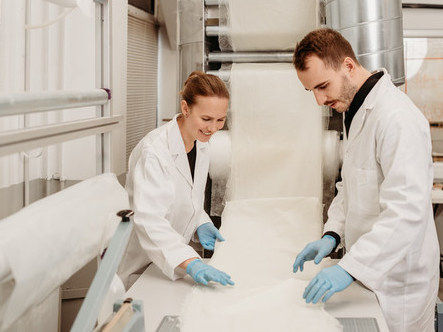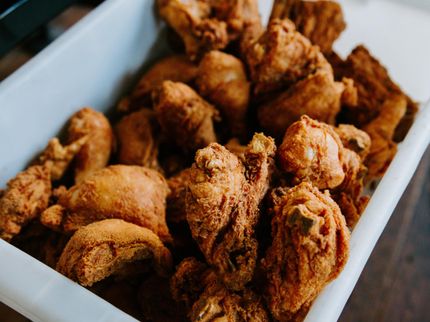Gelatex raises 1.2M in the seed round
Affordable and scalable manufactured cell-cultured meat could soon turn into reality
Estonian start-up Gelatex has a bold vision of starting a new chapter in the futuristic story "cell-cultured meat cheaper than ever: how did it happen?"

Gelatex founders: Mari - Ann Fonseca & Märt - Erik Martens
Gelatex
Gelatex has found a solution to scale and enhance the production of nanofibrous material that could be used to grow cell-cultured meat. Within their innovative team composed of materials science and business development professionals, they found an opportunity to use multi-purposeful, cheap, and easy-to-use nanofibrous 3D scaffolding in the manufacture of cell-cultured meat.
This scalable scaffold is needed for manufactured cell-cultured meat production in order to give the meat structure. Without it, meat would just be a paté-type of mush. Currently popular electrospun and hydrogel solutions that are used to enable cell-cultured tissue products are 90% more expensive than what Gelatex can do with their technology. If the currently popular manufacturing solutions persist, lab-grown meat will only be affordable for the richest of enterprises and individuals. Yet, by 2040, cultured meat is estimated to make up 35% of global meat production. And the demand for meat will only increase in growing Asian markets.
Gelatex gained confidence from the USA Techstars accelerator to find worthy investors for their cause. The 1.2M seed round led by Change Ventures and Crosslight Partners is proof that early trend investors have faith in their vision and team. The question remains, however: are the cell-cultured meat producers ready to take a significant step in the manufacture of meat?
CEO of Gelatex, Märt-Erik Martens, emphasized the fact that the seed round is an early milestone for the start-up, but there are already multiple reasons to be proud of their achievements. "We are running multiple pilot projects with 8 out of 10 world's leading cultured meat producers. We have run enough tests to know that our cheaper nanofibrous materials can make a true difference in the texture of cell-cultured meat. Currently, one kilogram of scaffolding material costs about 100 000 euros. Today, because of our technology, we are able to produce nanofibrous scaffolds at a price less than 1000 €/kg easily. If we stay true to our ambitions and keep scaling our technology, it will cost only 40 euros in less than 5 years," said Martens.
Most read news
Topics
Organizations
Other news from the department business & finance

Get the food & beverage industry in your inbox
By submitting this form you agree that LUMITOS AG will send you the newsletter(s) selected above by email. Your data will not be passed on to third parties. Your data will be stored and processed in accordance with our data protection regulations. LUMITOS may contact you by email for the purpose of advertising or market and opinion surveys. You can revoke your consent at any time without giving reasons to LUMITOS AG, Ernst-Augustin-Str. 2, 12489 Berlin, Germany or by e-mail at revoke@lumitos.com with effect for the future. In addition, each email contains a link to unsubscribe from the corresponding newsletter.
Most read news
More news from our other portals
Something is happening in the food & beverage industry ...
This is what true pioneering spirit looks like: Plenty of innovative start-ups are bringing fresh ideas, lifeblood and entrepreneurial spirit to change tomorrow's world for the better. Immerse yourself in the world of these young companies and take the opportunity to get in touch with the founders.




















































